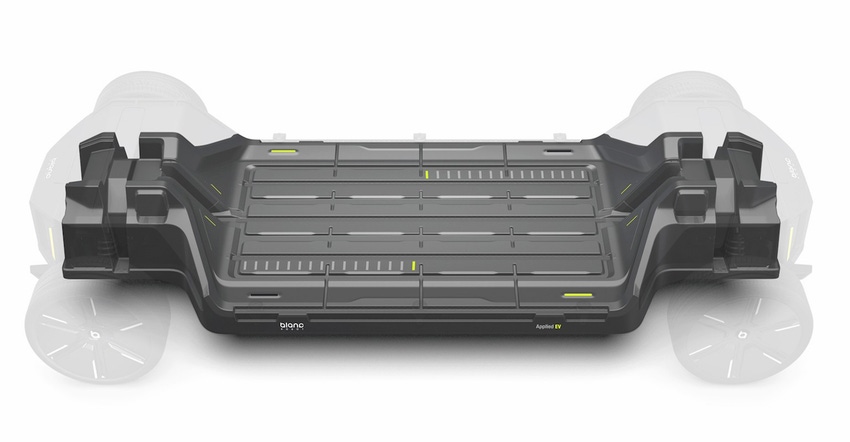Glass-Fiber Structural Molding Compound at Core of EV 'Skateboard'
The Continental Structural Plastics’ shell is 20% lighter than aluminum alternative.
February 3, 2021

Teijin Ltd. and its joint development partner Applied Electric Vehicles (Applied EV) have achieved a major milestone toward their shared vision for zero-emission future mobility.
By utilizing Teijin’s lightweight material technology and expertise in composites manufacturing, Teijin and Applied EV have delivered a production-ready, one-piece structural shell for Applied EV’s zero-emission robotic vehicle platform, the Blanc Robot. The shell is a key component and enables Applied EV to significantly reduce the weight and manufacturing complexity of the vehicle, achieving low mass, high energy efficiency, and structural performance.
The Blanc Robot’s shell, or top cover, is the largest single component on the vehicle, measuring about four square meters in total. It is made from a lightweight, high-strength, and highly rigid glass-fiber structural molding compound (GF-SMC) using molding technology provided by Continental Structural Plastics Holdings Corp. (CSP), the Teijin Group’s core automotive-composites business. CSP’s proprietary GF-SMC reduces the weight of the Blanc Robot’s shell by some 20% compared with an aluminum component and significantly simplifies the manufacturing process.
CSP's molding technology enables the integral molding of a sheet in thin, complicated shapes that are difficult to achieve using metal. Moreover, molding requires around three minutes. The GF-SMC shell allows the Blanc Robot to achieve the required structural performance to protect crucial equipment inside from damage. In addition to fire resistance, the shell provides dimensional stability and corrosion resistance.
GF-SMC delivers design and engineering freedom.
“Our joint development with Teijin is driving product innovation for mobility markets,” said Julian Broadbent, CEO of Applied EV. “Teijin's materials and technology allow us to achieve mass, energy efficiency, and cost results that cannot be achieved using more traditional methods. Using GF-SMC for this critical component provided a great deal of design and engineering freedom, which fundamentally changed our manufacturing method and capital cost, allowing us to be more competitive. It also creates a more energy-efficient and sustainable transport solution.”
“We expect our collaboration with Applied EV to help meet important needs in society by offering new solutions for automotive applications based on advanced materials and structural design required in next-generation EVs,” said Toshiaki Hotaka, General Manager, Mobility Division of Teijin Ltd. “Aiming to become a company that supports the society of the future, we have designated environmental value as one of Teijin’s priority fields for contributing to circular economies and sustainability.”
The Blanc Robot is a programmable, autonomous EV platform, designed and engineered by Applied EV. It can integrate with many autonomous systems, carry a range of vehicle bodies, and serve many purposes, including industrial, delivery, and surveillance applications.
Teijin and Applied EV are continuing to work together to further utilize Teijin’s lightweight material technologies for a range of other components, including structural elements, glazing, and exterior body panels for use in production EVs in the latter half of 2022.
The field of mobility is undergoing a significant transformation based on new concepts, including connected, autonomous, shared, and electric (CASE) vehicles and mobility as a service (MaaS). Electrification and autonomous technologies are rapidly being developed for next-generation automobiles, allowing a range of practical solutions that reduce environmental impact and address the changing needs of society, including transportation needs in aging societies.
Moving forward on "well-to-wheels."
The move to electric mobility is also raising awareness of the benefit in taking a “well-to-wheels” approach that considers the total energy efficiency of vehicles, including how electricity is sourced as well as how it is used in driving. Teijin and AEV launched their joint development initiative in 2019, to establish a technological foundation for supporting multipurpose zero-emission vehicles for a future society.
Applied EV has unique foundations in both automotive and robotics, allowing it to bring a fresh offering to the new mobility market. With a focus on efficiency and sustainability, it is lowering the cost and environmental impact of transportation. The Blanc Robot “skateboard” designed and engineered by Applied EV is the basis for many autonomous-use cases. Built around a core of electronics and mechatronics, running purely on software, the Blanc Robot is designed specifically for autonomous operation.
About the Author(s)
You May Also Like


